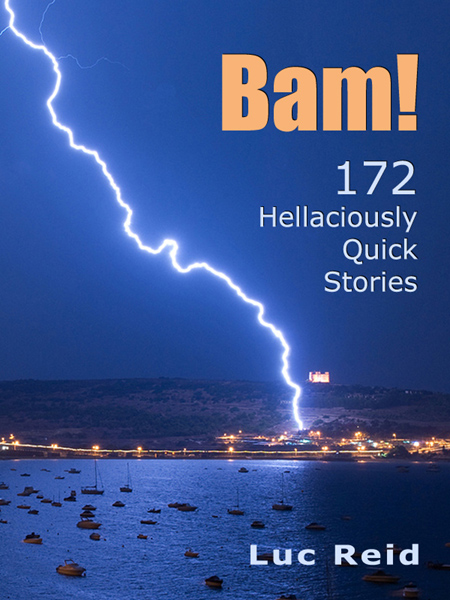There’s an old and revered legend that circulates among science fiction and fantasy writers, and it goes like this: “A lot of people won’t read science fiction just because it’s labelled ‘science fiction,’ so publishers call some science fiction ‘mainstream’ and then people will read it, but it’s really science fiction.” Optionally, the legend may include “Authors who won’t call their work science fiction are selling out.”
The same thing is said about fantasy; I’ll deal with science fiction here for convenience, but the same arguments apply.
As you can probably tell from the title of this entry, I don’t exactly agree with this idea, and I think the exact reason the ghetto is a myth leads to an important thing for writers (at least science fiction and fantasy writers) to understand, of which more in a moment.
What books are we talking about here? Margaret Atwood (for instance, The Handmaid’s Tale) and Kurt Vonnegut (Slaughterhouse Five, for example) get a lot of mentions in this context. More recent examples include Maria Doria Russell (The Sparrow) and Gregory Macguire (Wicked).
Here’s how people seem to look at this: if a story is set in the future (like The Handmaid’s Tale) or contains science fictional elements (like the interstellar flight in The Sparrow), it’s science fiction. If science fiction is defined solely by subject matter, that makes sense. But is that the most useful definition of science fiction? I’m big on “useful.”
Think about it this way: as a reader, which of the following is more important for you to know about a book?
A) Exactly what subject matter it contains, or
B) Whether or not you’re likely to enjoy it.
Or as a writer, which of the following do you care about more?
A) A taxonomic classification of your book based on an analysis of story and setting elements, or
B) Who will buy your book.
In both cases, we have a choice between A, which gives us rigid categories that take into account only certain aspects of a book and B, which gives us information about what books are good for what people.
A and B are not equivalent. Putting a spaceship into a story doesn’t necessarily make it appealing to all science fiction readers, and for many readers, how a story is told counts for a lot more than what props show up in it or when it’s set.
I’ll use the term “mainstream science fiction” here to describe stories that contain elements we usually associate with science fiction but that are written for a general audience instead of primarily for science fiction readers.
So, recently a writer friend and I were discussing Mary Doria Russell’s The Sparrow, which I’d call “mainstream science fiction,” and Hyperion, by Dan Simmons, a novel that’s clearly labelled and read as science fiction. My friend asked what I thought made The Sparrow mainstream science fiction and Hyperion genre science fiction. My answer was this:
1) The Sparrow focuses on the story and characters rather than the speculative elements. The speculative elements are background rather than foreground.
2) The Sparrow presents speculative elements gently, in ways that mainstream readers find easier to adjust to. No terms are thrown out without indications of what they mean. No speculative elements are introduced simply for coolness factor: they are streamlined to the essentials required to tell the story.
I readily admit that these aren’t hard-and-fast distinctions, but they’re meaningful distinctions to readers.
Here’s the opening of The Sparrow:
On December 7, 2059, Emilio Sandoz was released from the isolation ward of Salvator Mundi Hospital in the middle of the night and transported in a bread van to the Jesuit Residence at Number 5 Borgo Santo Spirito, a few minutes’ walk across St. Peter’s Square from the Vatican.
And the opening of Hyperion:
The Hegemony Consul sat on the balcony of his ebony spaceship and played Rachmaninoff’s Prelude in C-sharp Minor on an ancient but well-maintained Steinway while great, green saurian things surged and bellowed in the swamps below.
In Hyperion, we’re supposed to take a variety of speculative elements (the existence of some sort of Hegemony; big, green monsters; and a spaceship with a balcony) in stride.
In The Sparrow, the only immediate speculative element is the date, and that is immediately comprehensible to everyone. Russell failed to take the initiative to come up with a more plausible future vehicle than a bread van or to create a brand new religious order. Throughout the rest of the first chapter, there is only a reference to a mission to a place (the reader will probably conclude that it’s a planet) called Rakhat, and a mention in passing of the fairly non-speculative effects of travelling at near light speed.
Hyperion has several times as many speculative elements on the first page as The Sparrow has in the entire first chapter. Actually, Hyperion has more speculative elements in the first sentence than The Sparrow has in its entire first chapter!
The essence of mainstream science fiction as compared to genre science fiction is how it expects its readers to deal with speculative elements, their tolerance and ability to grok them. So mainstream vs. genre is a meaningful distinction that is useful to readers, because it helps them select books that are or are not suited to their tastes. Some genre readers aren’t interested in mainstream fiction because it doesn’t have enough wild stuff. Some mainstream readers aren’t interested in genre fiction because it asks them to do things with their brains that they don’t like to do and that their brains aren’t currently good at.
Why is this important to writers? Because while every book you write has to be a book you love, you also have to know who else out there in the world will read it. If you want to reach a larger audience, you have to tell your story in a way that they will be willing to read. If you want to reach science fiction readers, you need to tell the story in the way that they want to hear it told. And these are basic writing choices rather than simply labels slapped on by publishers.
From here we get into trickier questions, like the Harry Potter stories. In a sense, Harry Potter stories are clearly fantasy: they throw out a lot of magical things and don’t explain everything. But they still don’t demand the reader to juggle ideas in the way the usual adult fantasy novel these days does, in part because there’s no attempt to justify the magical system. Thus the Harry Potter books manage to be mainstream books in the same way a science fiction movie like Independence Day, which doesn’t require audiences to imagine anything radically new, is a mainstream movie.
But there’s a subtler point here, which is that if you can make the payoff high enough, you can ask more of your readers (or viewers). Many kids and adults who wouldn’t have been interested in reading a fantasy story under normal circumstances simply got so much enjoyment out of Harry Potter that they were willing to accept his impossible world, just as many of Michael Crichton’s readers will sit still for discussions of reconstructing DNA because later in the story, they get to see characters they care about running from a ravenous T-Rex.
The lessons I take from all this are as follows, then. Rule one: write a story in a way that readers are willing to read it. Rule two: if you can write a story that fascinates people, you can break rule one and any number of other rules. Rules aren’t made to be broken, but you could argue that in writing, they are made to be transcended.
Like this:
Like Loading...







